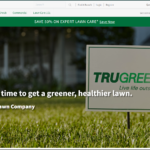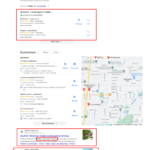In the digital landscape, reviews guide prospects toward trustworthy choices. Potential clients who encounter positive reviews see them as proof that others have benefited from your services. These testimonials validate your expertise and nurture lasting relationships.
If you want to improve your conversions and attract more leads from your digital marketing touchpoints, you’re in the right place. In this article, we’ll explore everything about landscaping reviews.
This will help you take action on how reviews help bring more business to your landscaping company, improve revenue, and build trust with your existing customers.
Why do you need online reviews 📝 for your landscaping business?
Reviews help your potential customers make a decision. They are an important factor in trusting the information they see on your website, social accounts, emails, and ads.
Lawn care service reviews are an essential source for evaluating the quality of your service. Prospective clients seek assurance that the landscaping service you provide delivers reliable, high-quality results. Positive reviews act as virtual testimonials, validating the credibility of the business.
In the digital landscape, businesses can selectively present themselves online. Reviews provide an external perspective, offering a more objective view of service quality. When potential clients encounter positive reviews, they perceive them as proof that others have benefited from the service, amplifying the credibility of the business.
Homeowners often base their choices on the experiences shared by others. A well-reviewed landscaping service stands out and attracts more prospects.
Reviews influence word of mouth: People need opinions or experience to comment on a product or a service. Helpful reviews and ratings reinforce their view of the product and give them the confidence to talk about it, providing word-of-mouth endorsement for your service.
As you know, referrals or word-of-mouth endorsements form the major channel for you to get new customers. Getting descriptive reviews and using them to build trust are important to enabling those endorsements for newer prospects.
Warranting theory and landscaping reviews
Before diving into actionable tips for generating reviews, let’s set up the context to help you direct your resources for maximum impact from online reviews.
The warranting theory sheds light on why online reviews play a crucial role in influencing people’s decisions, including those related to landscaping services. The theory focuses on how individuals evaluate information about others in online environments. This concept helps us understand how online reviews help shape impressions of a service.
Reviews are user-generated content posted online by others who have used your service.
Warranty theory considers the source of information apart from (helpfulness, informativeness, etc.) as a critical factor in shaping impressions.
What does it mean for your lawn care business?
This means that if you generate reviews for your service on a neutral platform (Google My Business profile, Trustpilot, Houzz, HomeStars, etc.), users would trust you more than just showing them a 5-star rating on your website.
This is because the less control you have on the platform with reviews about you, the less prone it is to manipulation.
Generating online reviews for your landscaping business
There are multiple ways to generate organic reviews for your business. The tips mentioned below assume that you are going to source these reviews using fair means and from your actual customers. Fake reviews look unnatural and are easily identified by prospects causing more harm than good for the reputation of your business.
When is the best time to ask for a review from a customer?
Below are the best times we’ve maximized our chances of receiving a review from a homeowner, even for a small landscaping job such as mowing.
- After a Recent Purchase:
Ask shortly after a customer has paid you for the service or signed the contract. At this moment, they are most invested in the product or service.
Why? Fresh in their minds, they can provide valuable feedback based on their recent experience. - After Stellar Service Delivery:
If you know you’ve delivered exceptional landscaping service, seize the opportunity.
Why? Satisfied customers are likelier to share positive reviews when their experience is still vivid. - After Unsolicited Praise:
When someone makes a glowing, unprompted social media post or comment about your business, it’s ideal to ask for a review. Talking to your employees or praising them in person is another cue for them to ask for their review.
Why? Their enthusiasm indicates high satisfaction, making them more likely to leave a positive review. - Post Referrals:
After someone refers a friend to your business, ask for a review.
Why? Referrers are already advocates, and their positive sentiments can translate into reviews.
How do you select the platform for collecting your lawn care service reviews?
You have multiple options for collecting reviews. As mentioned before, these places should be neutral and prominently display that the reviews are natural and organic and can’t be manipulated.
Some good options for landscaping businesses are:
- Google My Business profile
- Angi
- Homestars
- Houzz professionals
- Yelp
- Thumbtack
- Social media channels – Facebook, Instagram and Reddit
In our experience, the place you want to focus depends on your marketing plan and activities.
Online reviews wield the power to transform mere curiosity into unwavering trust. Potential clients who encounter positive reviews see them as proof that others have benefited from your services. These digital endorsements validate your expertise and nurture lasting relationships.

You’re collecting reviews for a reason, so if you use the ratings and reviews as an endorsement, you need to select the marketing/sales channels where you are acquiring most of your customers.
The channel matters because all of these touchpoints are where your new prospects or older deals learn more about you. At these touchpoints, you’ll have an opportunity to show them that others trust you.
Use these tips to select a platform where you collect reviews:
- Start collecting reviews on your Google business profile if you’re building your brand and running Google and Meta ads for brand awareness. If you run ad campaigns for awareness, people will start researching your company by putting your name on Google. And guess what comes first when someone types in your company name in the Google search bar? It is your Google business profile.
- If you’ve optimized your GMB profile already, it’s time to focus on channels where your prospects generally search for services. If your local area residents search for landscapers on Angi, you need to optimize your ratings there.
- If most of your target audience searches Yelp, ask your happy customers to review you on threads mentioning you. Michael Luca in their working paper found through research that “a one-star increase in Yelp rating leads to a 5-9 percent increase in revenue” (for restaurant-like service business)
- Platforms like Houzz have their own advertisement packages. If you’re subscribed to any of those, it would make sense for you to get more reviews and ratings on Houzz to make your profile stand out.
Example: TruGreen Richmond
Here is an example of how Trugreen has gotten good reviews on Google, which brings them more business. Other places like Yelp or Homestars though, could do better.
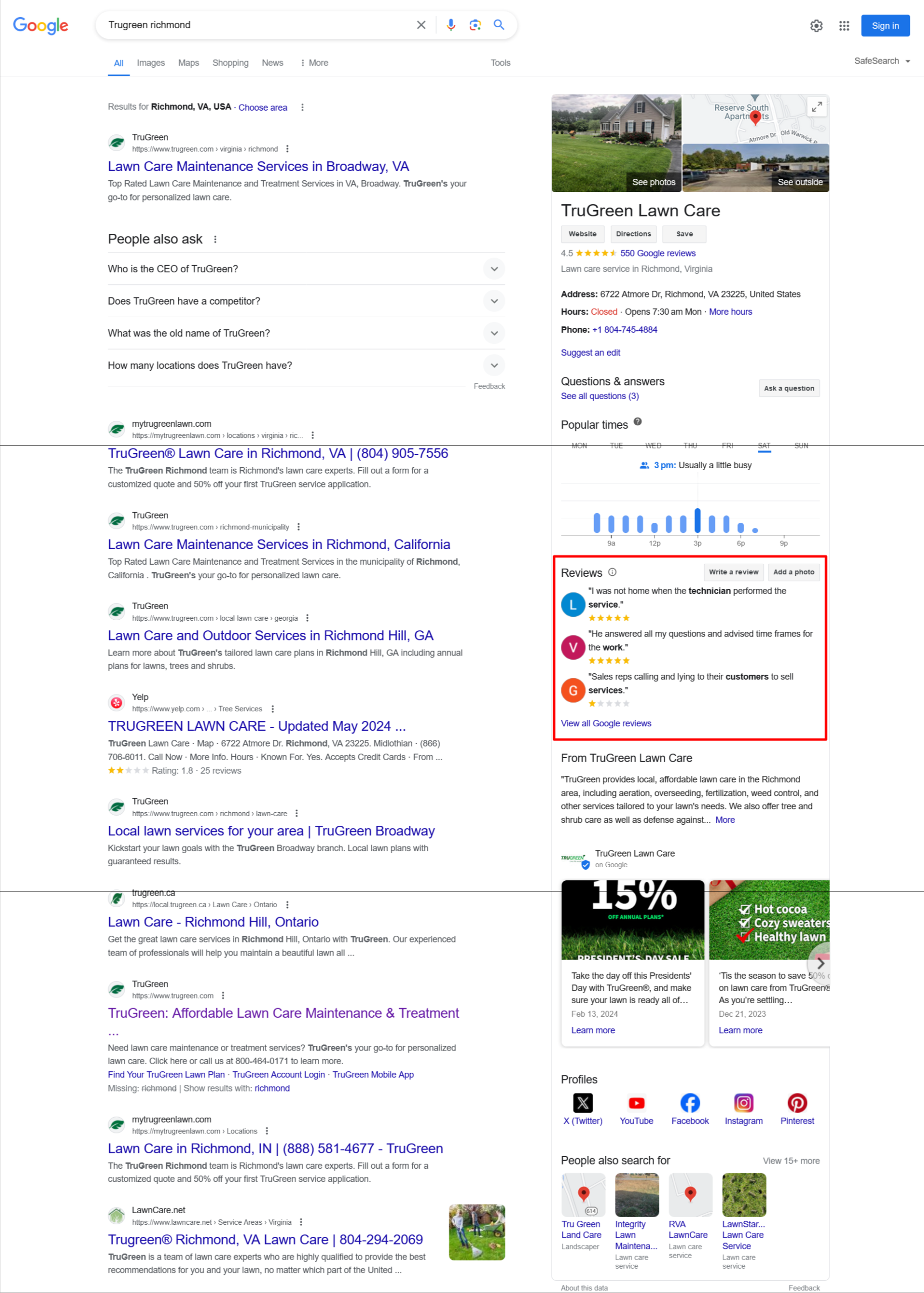
Though they have claimed their profile on Yelp, it is evident that they’ve not addressed some reviews. It also seems like they’ve not collected many of these reviews on Yelp, which surfaces many user-generated ones on the profile.
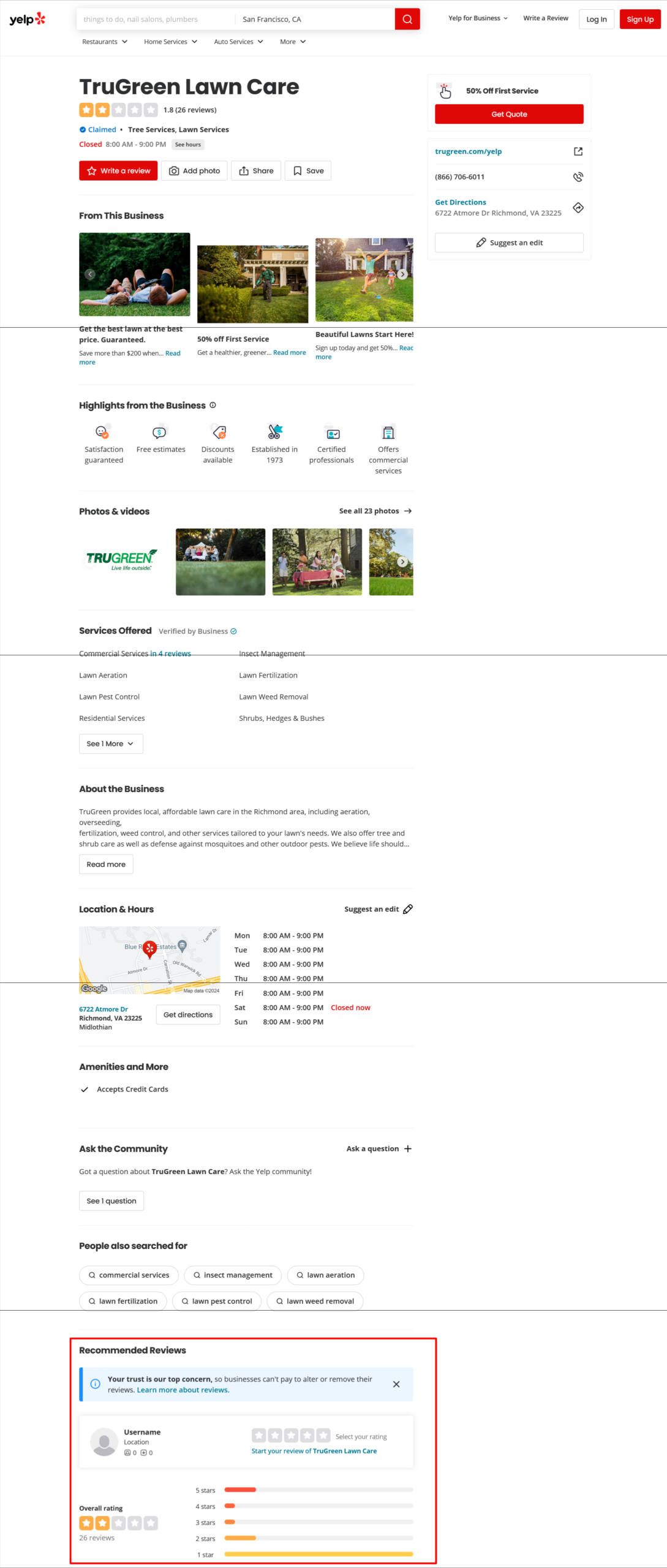
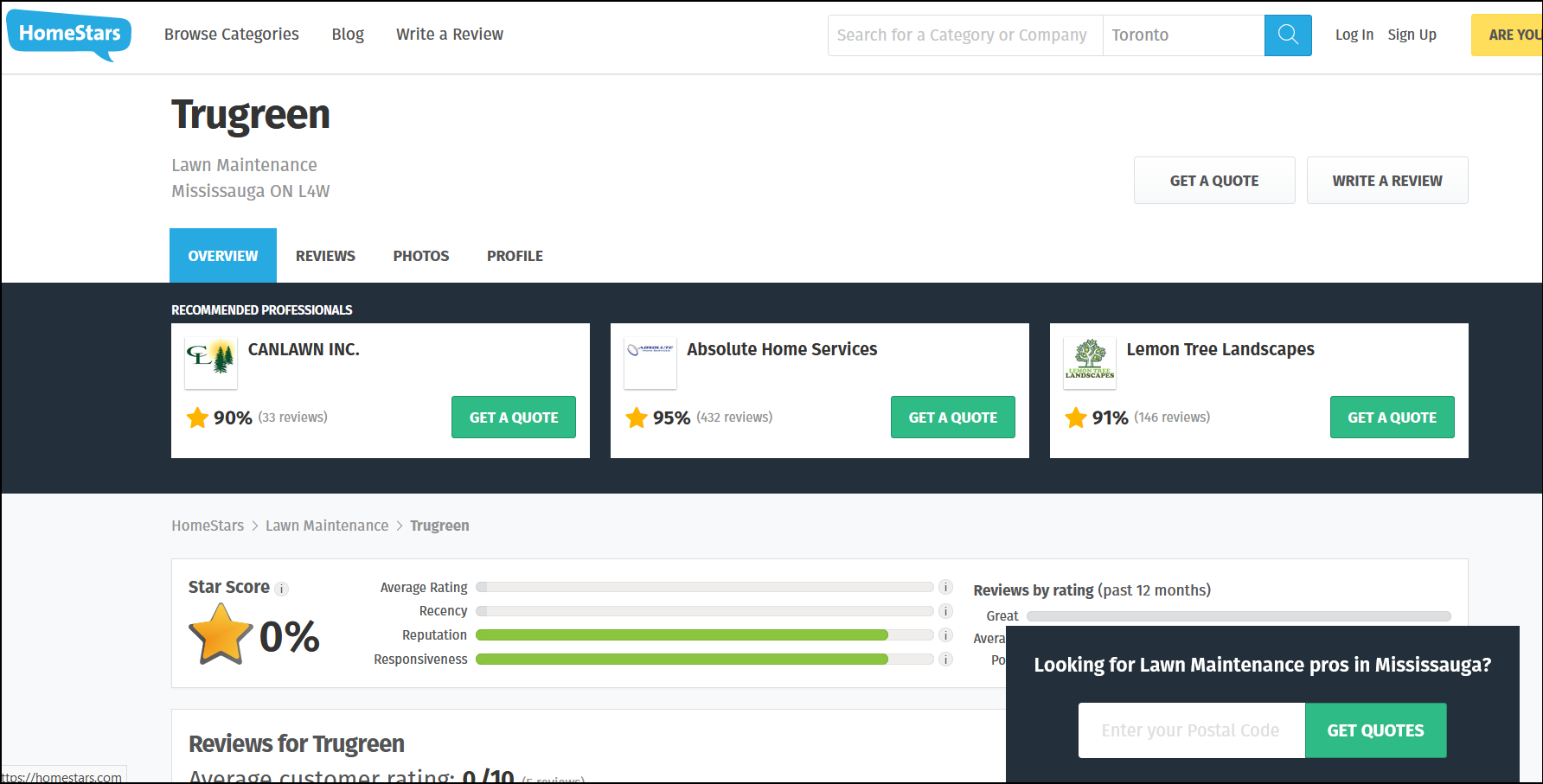
Landscaping is a local service area business, so these profiles don’t represent every Truegreen business. However, each profile affects the reputation of the whole company.

Secrets to generating reviews that boost your credibility
The secret is (drumroll).. that you’ve to ASK for reviews. If you are marketing a SaaS product, there are ways you can nudge people to give you reviews without having to ask, but since you are in a people-intensive service business, you need to ask people to give a recommendation.
The most you can do to be efficient is ask at the right time (ask for a review when they are the happiest) and provide some incentive to them in the form of discounts or coupons you’d give away anyway.
Apart from that, we’d say that personalization is the key. You should ensure that your way of asking is genuine and that you’ve personalized the request. Just like generic emails don’t elicit a response, generic review requests wouldn’t get you replies.
Include the name of the person and more importantly, the instances where your service or your employees made your customer happy.
Another tip to help generate more reviews in addition to what you already have is to respond to every review/rating that you’ve received.
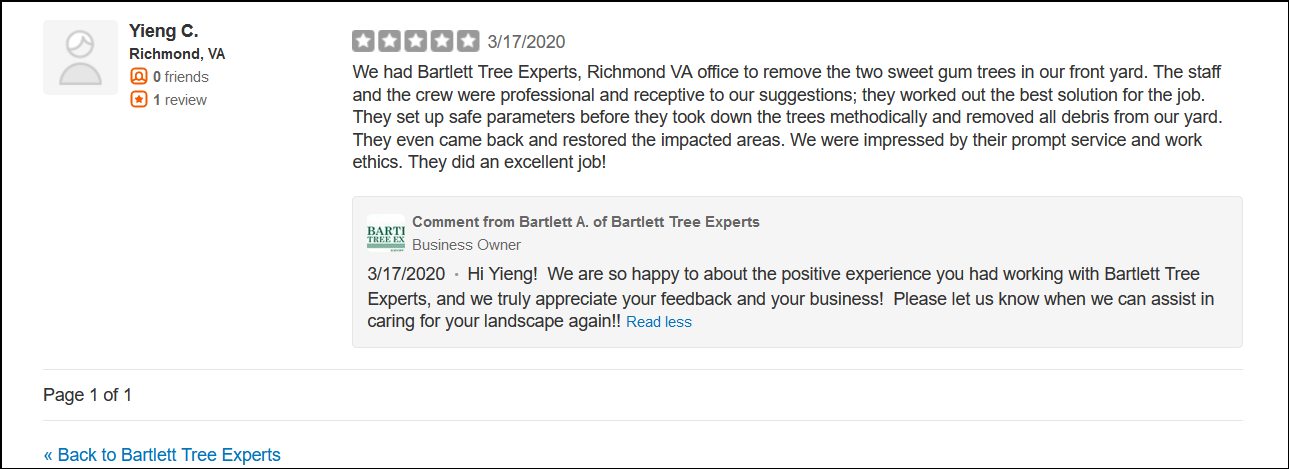
This shows that you care what people think about you and that you’re there to support their success and your reputation. The whole thing just makes it easier to trust you, and your response to other reviews motivates other prospects to give you reviews.
Where to use your landscaper reviews
In the competitive world of landscaping, customer reviews can be a game-changer. Learn how to effectively use customer reviews across various platforms and marketing materials.
1. Social Media
Businesses share parts of testimonials and reviews on social media to establish trust with their followers.


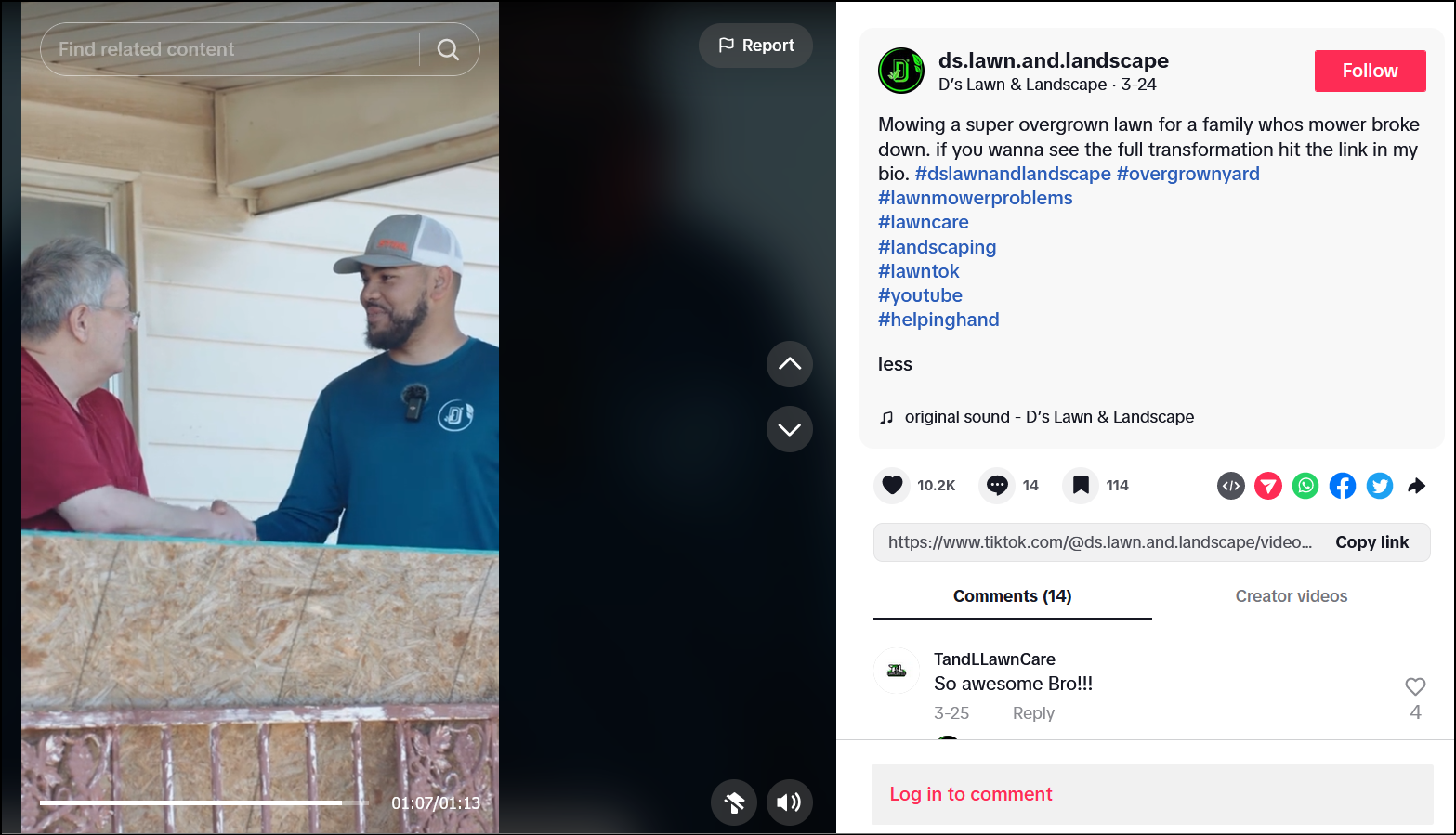
2. Print
Incorporate positive reviews in your brochures, flyers, and other print materials.
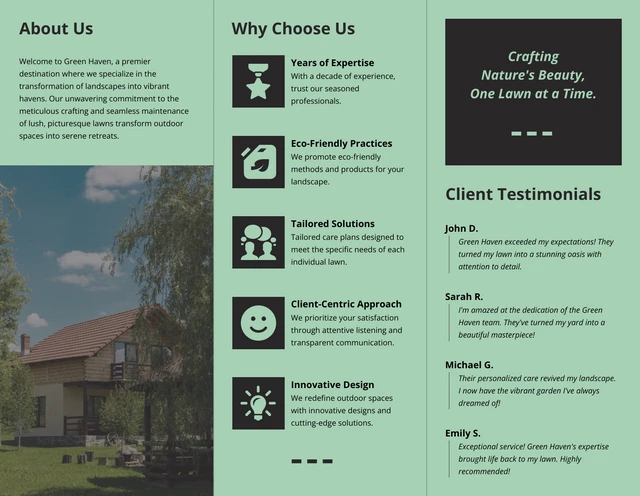
3. Website
Your landscaping website is the digital face of your business. Dedicate a fold in your landing pages or a whole page to showcase your customer reviews.
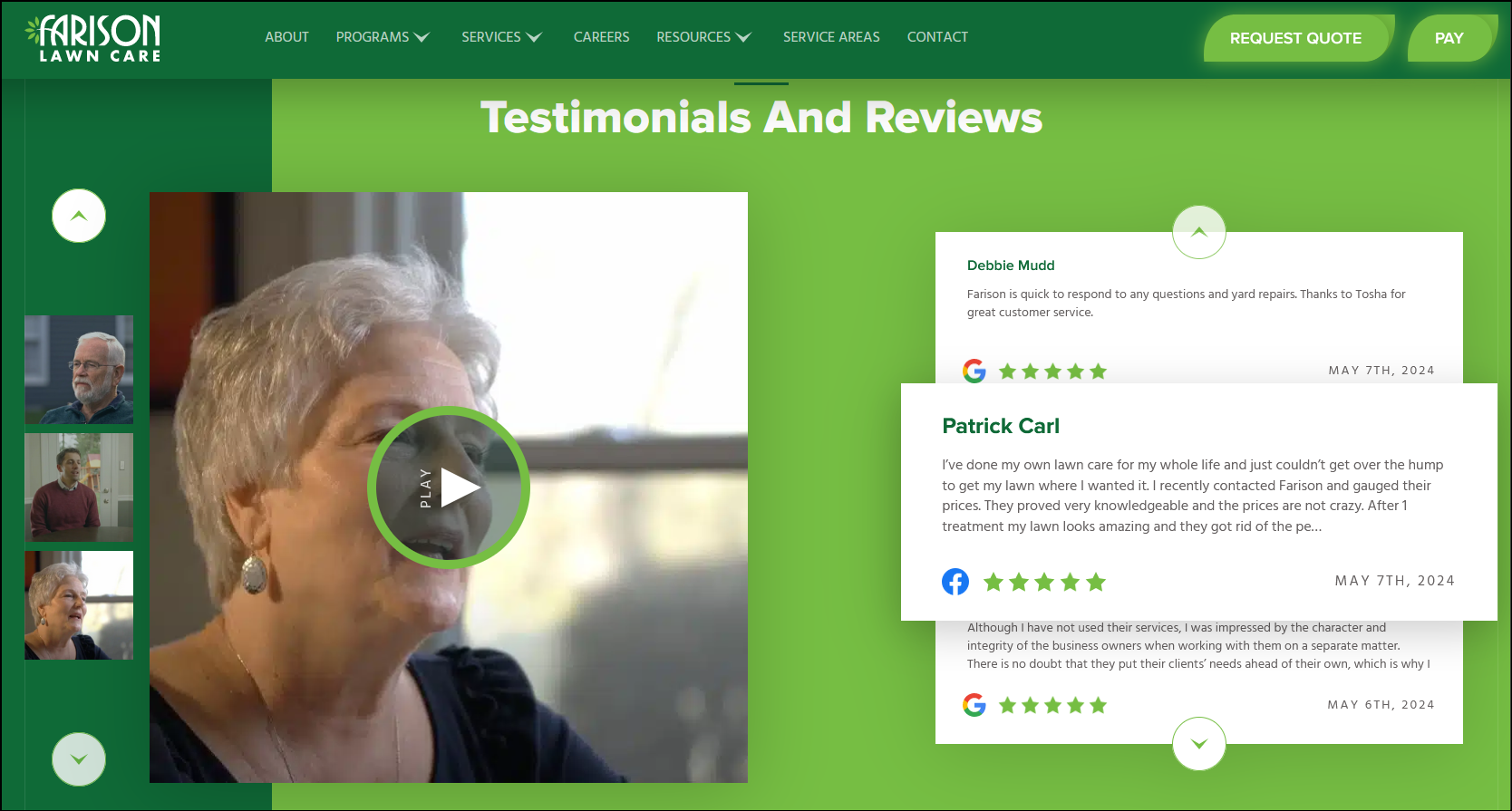
4. Emails
Include customer reviews in your email newsletters. This can help build trust with your subscribers and encourage them to use your services.

5. Digital Ads
Use customer reviews in your ad copy or images on Facebook, Instagram, Google, etc. This can make your ads more compelling and increase click-through rates.
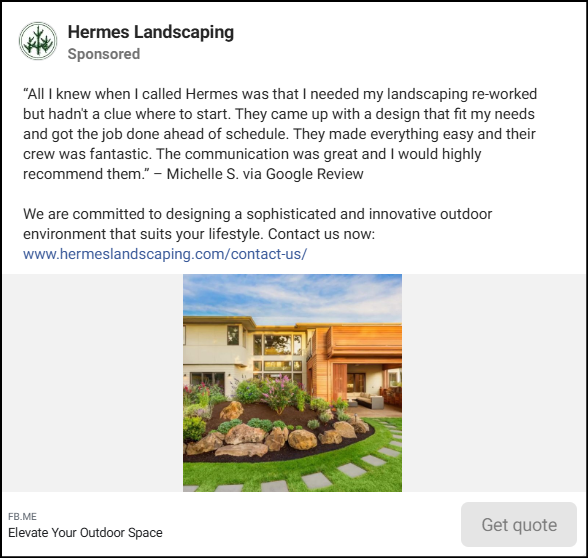
Which types of reviews are best for your business?
In-depth reviews form a significant part of the best reviews that are helpful to others who are looking for the services you offer. In general, think about these factors while generating quality reviews:
- Specific Information: Reviews that mention precisely what services were used and the results are more helpful than vague ones. For example, “They did a great job mowing my lawn” is good, but “Their aeration treatment helped clear up the brown patches in my yard” is even better.
- Context: Knowing the reviewer’s situation helps us understand the service’s impact. Did the lawn care company revive a neglected lawn or maintain an already healthy one?
- Story: A brief story about the experience makes the review more engaging and memorable. For instance, “The crew was friendly and explained everything they were doing. Now I can finally enjoy spending time in my backyard again!”
- Helpfulness: Does the review answer questions potential customers might have? Talking about value for money, scheduling ease, or communication with the company can be helpful.
- UGC Photos and Videos: User-generated content (UGC) means pictures or videos taken by the customer. These can be powerful because they visually show the results of the lawn care service.
Examples of quality and helpful reviews
How to reply to negative reviews – managing your online reputation
Without going into the importance of replying to negative reviews, we’ll jump right into how you can do it better.
It is worth mentioning that a speedy response using a human voice for a negative review works better at building trust for old customers and new prospects than having no response at all.
When you are conducting service recovery for your lawn care business, using the triple A framework can help turn your customers’ frustration into delight.
Acknowledge, account, and act
- Acknowledge:
- Begin by thanking the customer for their feedback. Show appreciation for their time and effort in sharing their experience.
- Use phrases like:
- “Thank you for bringing this to our attention.”
- “We appreciate your feedback.”
- “We apologize for your experience.”
- Account:
- Take responsibility for the issue. Avoid blaming the customer or making excuses.
- Show empathy and understanding. Acknowledge their frustration or disappointment.
- Example phrases:
- “We understand how frustrating this must be.”
- “We take full responsibility for the inconvenience caused.”
- “We’re sorry that you had to go through this.”
- Act:
- Provide a solution or action plan. Explain how you’ll address the issue.
- Be specific and transparent about the steps you’ll take to resolve it.
- Example responses:
- “We’re actively investigating this matter and will take necessary steps to prevent it from happening again.”
- “Our customer service team will contact you shortly to resolve this.”
- “We’ll improve our processes based on your feedback.”
An apology, explanation and pledge to correct the problem identified in the review increase the intention to purchase your services when these elements are present in your response.
Some examples of how companies tackle negative reviews:
These examples should serve as an example of what you can do better so you have an edge in competition (Hint: use the triple A framework from above).
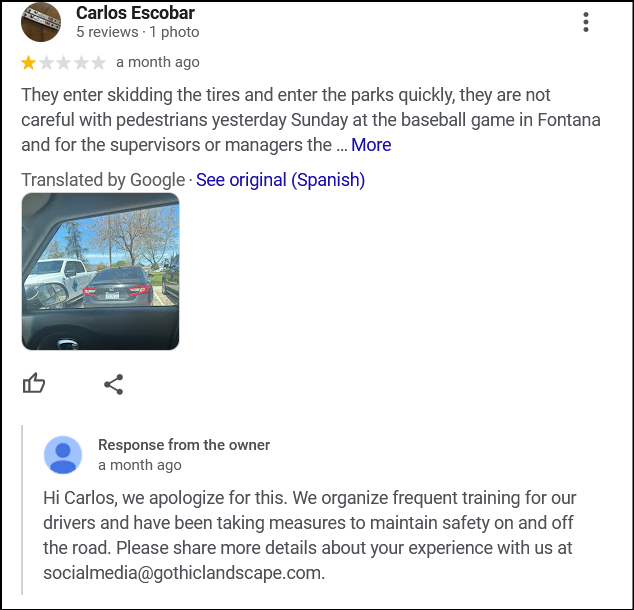
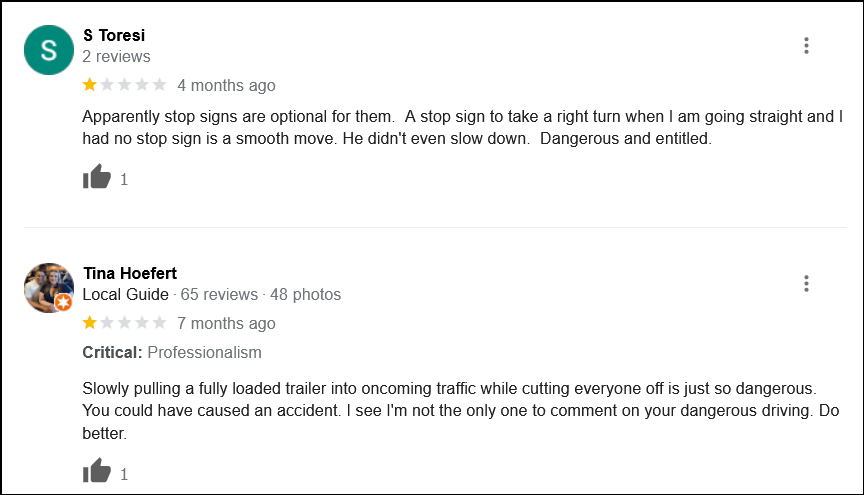
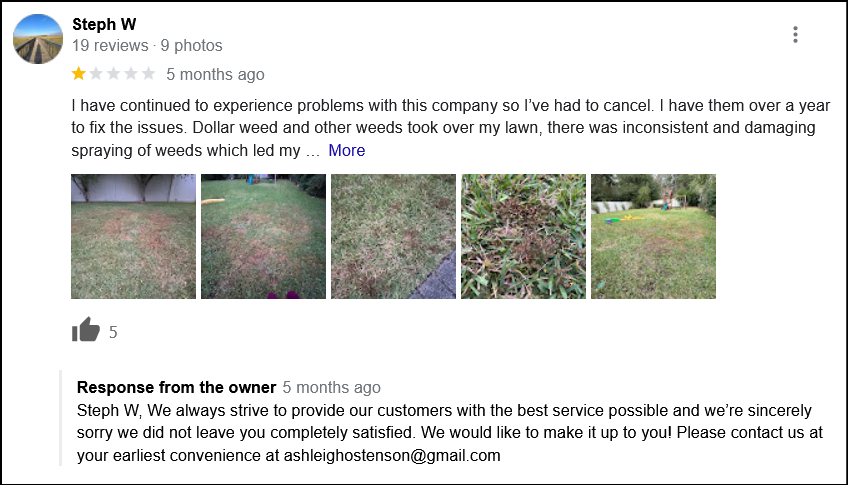

Concluding Tips
- Make it easier for them to review you
- Incentivize or compensate for their efforts
- Give customers enough time to use the product or service and form an opinion before requesting a review.













